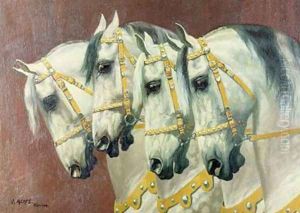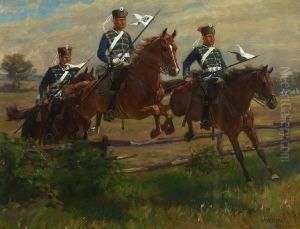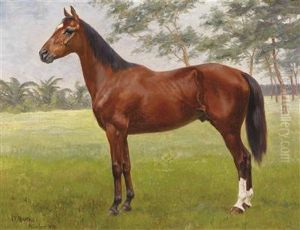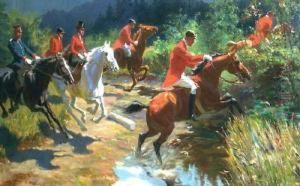Oskar Merte Paintings
Oskar Merte was a German artist and educator whose contributions to the world of art and design were notably influenced by the movements and shifts in European art during the early 20th century. Born on October 26, 1879, in the city of Dresden, Germany, Merte's early life was set against the backdrop of a rapidly industrializing Europe, a factor that would later influence his artistic endeavors and educational philosophies.
Merte's artistic journey began at the Dresden Academy of Fine Arts, where he honed his skills in painting and drawing. His style was initially influenced by the prevailing trends of academic art, but he soon found himself drawn to the more progressive and expressive movements that were emerging at the time, such as Expressionism and the Bauhaus movement. These movements sought to break away from traditional forms and techniques, advocating for a synthesis of arts, crafts, and technology, principles that deeply resonated with Merte.
Throughout his career, Oskar Merte was not just a practitioner but also a passionate educator. He believed in the transformative power of art education and was dedicated to reforming art pedagogy. His teaching philosophy was rooted in the idea that art should not be an isolated discipline but should be integrated with other fields of study and aspects of daily life. This holistic approach to art education was innovative at the time and influenced the development of art education in Germany.
During the 1920s and 1930s, Merte's work began to reflect the increasing tensions and socio-political upheavals in Germany. His art evolved to include more abstract and symbolic elements, which were both a reflection of his personal response to the turmoil of the times and an expression of the broader existentialist concerns of European society.
Oskar Merte's contributions extended beyond his own artistic creations. He was instrumental in the establishment of several art institutions and workshops that aimed to democratize art and make it accessible to a broader audience. His efforts were not only in nurturing future generations of artists but also in advocating for the role of art in public life and its potential to foster community and cultural identity.
Merte continued to teach and create art until his retirement. He passed away on June 10, 1952, leaving behind a legacy that had a lasting impact on the art world. His vision for a comprehensive and inclusive approach to art education, as well as his commitment to integrating art into the fabric of society, continues to inspire educators and artists around the globe.



